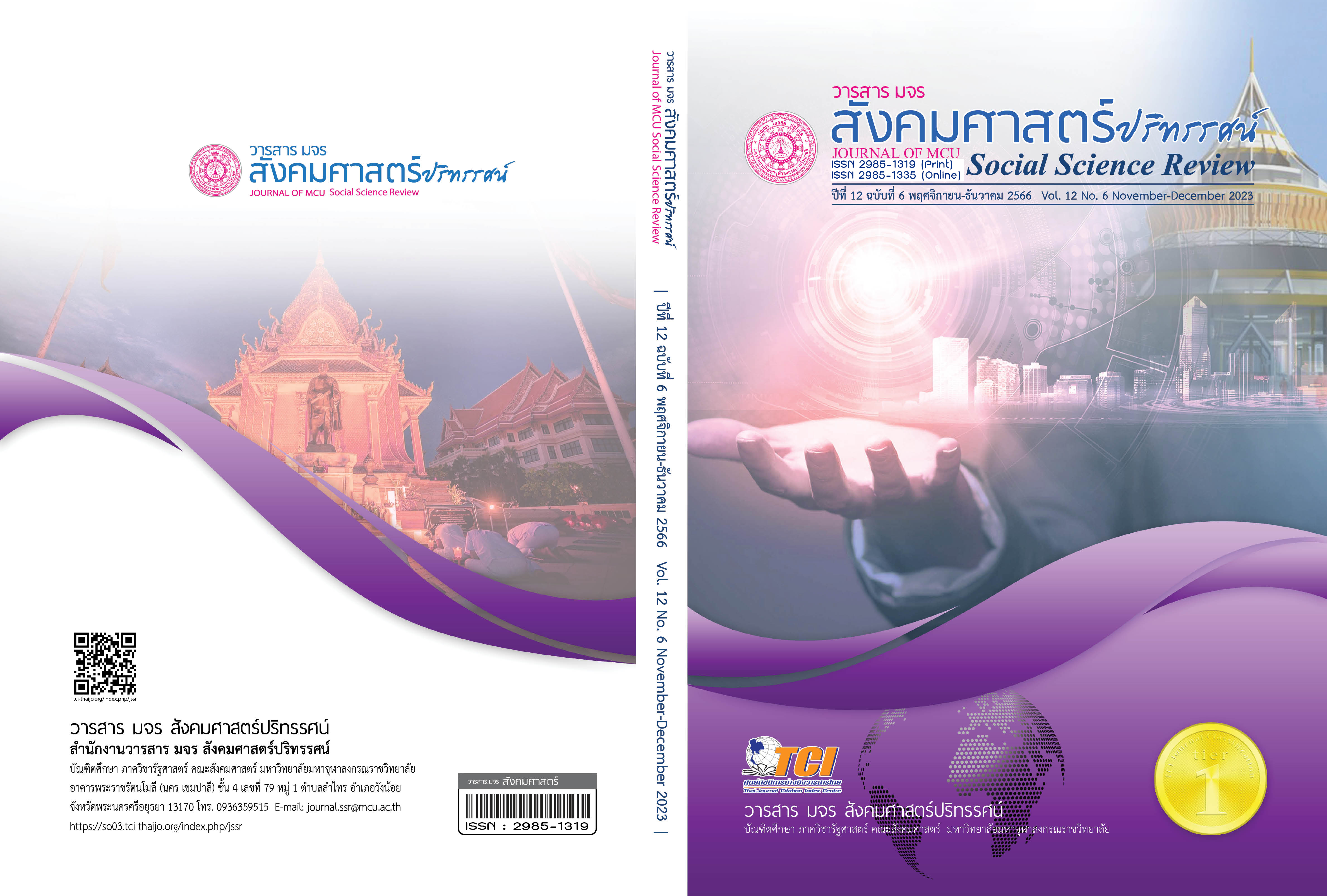รูปแบบการบริหารจัดการธุรกิจรีสอร์ทเขตพื้นที่จังหวัดกาญจนบุรี
คำสำคัญ:
รูปแบบ, การบริหารจัดการ, โมเดลธุรกิจ, รีสอร์ทบทคัดย่อ
บทความวิจัยนี้มีวัตถุประสงค์ 1. ศึกษารูปแบบการบริหารจัดการและปัจจัยที่ส่งผลต่อธุรกิจรีสอร์ท เขตพื้นที่จังหวัดกาญจนบุรี 2. สร้างรูปแบบการบริหารจัดการธุรกิจรีสอร์ท เขตพื้นที่จังหวัดกาญจนบุรี และ 3. นำเสนอรูปแบบการบริหารจัดการธุรกิจรีสอร์ท เขตพื้นที่จังหวัดกาญจนบุรี ด้วยกระบวนการวิจัยเชิงคุณภาพ ด้วยรูปแบบการบริหารจัดการตามแนวทางโมเดลธุรกิจ จากผู้ให้ข้อมูลสำคัญ 19 คน การเก็บรวบรวมข้อมูลใช้การสัมภาษณ์เชิงลึก
ผลการวิจัยพบว่า 1. รูปแบบการบริหารจัดการด้านกลุ่มลูกค้าควรขยายกลุ่มลูกค้าให้มีความหลากหลาย ด้านคุณค่าของบริการควรทันสมัย สะอาด มีสุขลักษณะ ด้านช่องทางการเข้าถึงลูกค้าควรมีการโฆษณาประชาสัมพันธ์ผ่านสื่อออนไลน์ในทุกรูปแบบ 2. ต้องสร้างรุปแบบสัมพันธ์กับลูกค้าควรตอบสนองความต้องการและแก้ไขปัญหาอย่างรวดเร็ว ด้านรายรับได้จากค่าที่พักและค่ามัดจำล่วงหน้าในราคาที่เหมาะสม จับต้องได้ ด้านรายจ่ายหรือต้นทุน การดูแลและบำรุงรักษาสถานที่ให้สะอาด ถูกสุขลักษณะ ทันสมัย และปลอดภัย ด้านทรัพยากรหลัก มีสิ่งอำนวยความสะดวกครบครัน ด้านกิจกรรมหลัก มีบริการฟิตเนส สระว่ายน้ำ ร้านค้า ร้านบริการซักรีด และผู้ร่วมงานหลัก ควรมีพันธมิตรในมาตรฐานเดียวกันไว้บริการในกรณีที่พักเต็ม 3. ปัจจัยที่ส่งผลต่อธุรกิจรีสอร์ท เขตพื้นที่จังหวัดกาญจนบุรี ด้านปัจจัยด้านสภาพแวดล้อมภายในองค์การ ได้แก่ บุคลากร แนวทางการบริหารงาน และทำเลที่ตั้ง ด้านปัจจัยด้านสภาพแวดล้อมภายนอกองค์การ ได้แก่ เศรษฐกิจ การเมือง สังคม และการมีพันธมิตรทางธุรกิจ และด้านคุณลักษณะของผู้ประกอบการ ได้แก่ ความตั้งใจและต้องกล้าลงมือทำ การเลือกวิธีการที่เหมาะสม มีบุคลากรที่เชี่ยวชาญในแต่ละด้าน และการเตรียมความพร้อมรับสถานการณ์ตลอดเวลา
เอกสารอ้างอิง
ธนพฤกษ์ ชมะรัตน์. (2556). การวิเคราะห์ปัจจัยภายในภายนอก. สืบค้น 8 ธันวาคม 2564, จากhttp://yasothon.mol.go.th/sites/yasothon.mol.go
พระครูพิทักษ์ศิลปาคม (นุชิต วชิรวุฑฺโฒ) และคณะ. (2565). รูปแบบการบริหารจัดการการท่องเที่ยวเชิงวัฒนธรรมของวัดในจังหวัดราชบุรี. วารสาร มจร สังคมศาสตร์ปริทรรศน์, 11(1), 180-196.
พิมพ์ชนก ธีรยศภูวนันท์ และเด่น ชะเนติยัง. (2560). รูปแบบการปลูกฝังค่านิยมพื้นฐานด้านการบริหารกิจการนักเรียนในสถานศึกษาระดับประถมศึกษาสำนักงานเขตพื้นที่การศึกษาประถมศึกษากาญจนบุรี เขต 1. วารสาร มจร สังคมศาสตร์ปริทรรศน์, 6(2 ฉบับพิเศษ), 977-988.
ไพเราะ มีภักดี. (2565). รูปแบบการพัฒนาภาวะผู้นําการเปลี่ยนแปลงของผู้บริหารสถานศึกษาในศตวรรษที่ 21 สังกัดสำนักงานเขตพื้นที่การศึกษามัธยมศึกษา. วารสาร มจร สังคมศาสตร์ปริทรรศน์, 11(2), 69-81.
วัฒนา ทนงค์แผง. (2562). รูปแบบการบริหารจัดการธุรกิจโรงแรมขนาดเล็ก เขตพื้นที่จังหวัดตราด. สืบค้น 8 ธันวาคม 2564, จาก http://www.tdc.thailis.or.th/td
วีระศักดิ์ โควสุรัตน์. (2561). การเสริมสร้างความร่วมมือระหว่างผู้ประกอบการการท่องเที่ยวและวัฒนธรรม. สืบค้น 8 ธันวาคม 2564, จาก https://www.mots.go.th/News-view.php?nid=11093
สำนักงานกระทรวงการท่องเที่ยวและกีฬา. (2562). สถิติด้านการท่องเที่ยว ปี 2562. สืบค้น 8 ธันวาคม 2564, จาก https://www.mots.go.th/more_news_new.php?cid=521
สำนักงานจังหวัดกาญจนบุรี. (2563). แผนพัฒนายุทธศาสตร์จังหวัดกาญจนบุรี. สืบค้น 8 ธันวาคม 2564, จากhttps://kanchanaburi.mots.go.th
Corbin, J., & Strauss, A. (2007). Basics of qualitative research: Techniques and procedures for developing grounded theory (3rd ed.). Thousand Oaks, CA: Sage.
Patton, M. Q. (2001). Qualitative Research and Evaluation Methods (3rd ed). Thousand Oaks, CA: Sage
ดาวน์โหลด
เผยแพร่แล้ว
รูปแบบการอ้างอิง
ฉบับ
ประเภทบทความ
สัญญาอนุญาต
ลิขสิทธิ์ (c) 2023 วารสาร มจร สังคมศาสตร์ปริทรรศน์

อนุญาตภายใต้เงื่อนไข Creative Commons Attribution-NonCommercial-NoDerivatives 4.0 International License.
เพื่อให้เป็นไปตามกฎหมายลิขสิทธิ์ ผู้นิพนธ์ทุกท่านต้องลงลายมือชื่อในแบบฟอร์มใบมอบลิขสิทธิ์บทความให้แก่วารสารฯ พร้อมกับบทความต้นฉบับที่ได้แก้ไขครั้งสุดท้าย นอกจากนี้ ผู้นิพนธ์ทุกท่านต้องยืนยันว่าบทความต้นฉบับที่ส่งมาตีพิมพ์นั้น ได้ส่งมาตีพิมพ์เฉพาะในวารสาร มจร สังคมศาสตร์ปริทรรศน์ เพียงแห่งเดียวเท่านั้น หากมีการใช้ภาพหรือตารางหรือเนื้อหาอื่นๆ ของผู้นิพนธ์อื่นที่ปรากฏในสิ่งตีพิมพ์อื่นมาแล้ว ผู้นิพนธ์ต้องขออนุญาตเจ้าของลิขสิทธิ์ก่อน พร้อมทั้งแสดงหนังสือที่ได้รับการยินยอมต่อบรรณาธิการ ก่อนที่บทความจะได้รับการตีพิมพ์ หากไม่เป็นไปตามข้อกำหนดเบื้องต้น ทางวารสารจะถอดบทความของท่านออกโดยไม่มีข้อยกเว้นใดๆ ทั้งสิ้น





